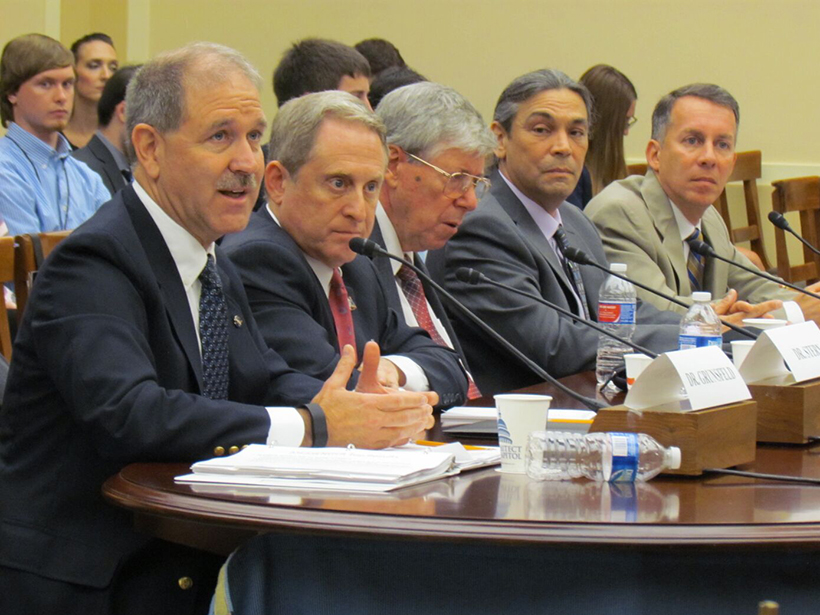A Congressional hearing last week about exploration of the solar system alternated between amazement at recent successes, such as the Pluto flyby, and acrimony about projected funding levels for planetary science at NASA.
At the 28 July hearing, Rep. Lamar Smith (R-Texas), chair of the House of Representatives’ Committee on Science, Space, and Technology, lambasted as inadequate the Obama administration’s budget request for NASA planetary sciences for fiscal year (FY) 2016.
“Funding levels requested by the Obama administration would slow the rate at which we can develop, build, and launch new missions.”
“Funding levels requested by the Obama administration would slow the rate at which we can develop, build, and launch new missions,” Smith said. He cited the New Horizons mission, which recently achieved a close flyby of Pluto, as an example of the type of mission that could be impeded. House-approved funding levels “would allow NASA to keep planetary missions like New Horizons on track,” he said.
Ranking member Rep. Eddie Bernice Johnson (D-Texas) noted that Congress needs to do its part in keeping NASA’s solar system exploration program robust “by making sure NASA receives adequate and timely funding to support the development and operation” of solar system missions. She also called for funding for advanced technology development to enable missions to “continue to rewrite the science textbooks.”
A Key Difference
The administration requested $1.36 billion for NASA planetary sciences in FY 2016, down $77 million from the FY 2015 enacted level of $1.44 billion. The House passed an appropriations bill calling for $1.56 billion, $200 million more than President Obama has asked for.
A key difference between the administration and House proposals is how much funding each allocates to missions to study Earth versus those to explore other planets and beyond. The House targeted NASA Earth science funding for cuts. It passed increased funding for exploration directed outward into the solar system, an endeavor popular with many House members.
Additional Funding Could Keep Missions Moving, Witnesses Say
At the hearing, John Grunsfeld, associate administrator of NASA’s Science Mission Directorate, said that if the agency was given more planetary science funding, it could speed up the pace at which high-priority “Discovery-class” and “New Frontiers–class” planetary missions reach milestones and launch. New Horizons was the first mission under the New Frontiers program, which caps missions at $1 billion; Discovery missions are capped at $450 million.
Young planetary scientists question whether they can stay in the field because of the kinds of cuts that have happened.
Robert Pappalardo, the project scientist for the Europa mission at NASA’s Jet Propulsion Laboratory in Pasadena, Calif., testified that the pace of possible exploration of Jupiter’s moon Europa depends on the pace of the funding. “We can walk or we can crawl to get there.” He added that young planetary scientists “question whether they can stay in the field because of the kinds of cuts that have happened.” These cuts eliminated some research programs associated with missions.
Déjà Vu
Funding included in the House bill could move up a Europa mission launch compared to how quickly it could happen under the Administration proposal, Casey Dreier of the Planetary Society told Eos after the hearing. Dreier is advocacy director for the nonprofit organization, which serves space exploration enthusiasts.
The House bill also includes money for two active missions—the Mars Opportunity rover and the Lunar Reconnaissance Orbiter—that are zeroed out in the administration’s request, Dreier noted. The FY 2016 proposals repeat a pattern that has recurred with every budget request since FY 2013, he said: The administration request cuts planetary science funding that Congress has restored every time.
Space Showcase
Although pending budgets for planetary science emerged as a contentious issue at the hearing, the event mainly served to showcase the recent Pluto flyby and other NASA solar system exploration missions, such as a mission to Europa and the Dawn mission to the dwarf planet Ceres and asteroid Vesta.
—Randy Showstack, Staff Writer
Citation: Showstack, R. (2015), Hearing sparks concerns about planetary science funding, Eos, 96, doi:10.1029/2015EO033699. Published on 3 August 2015.

